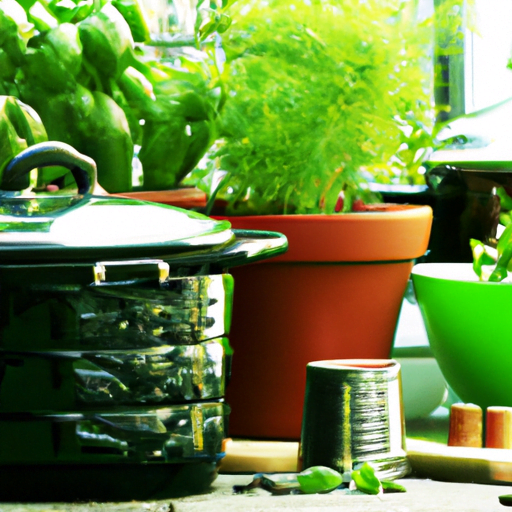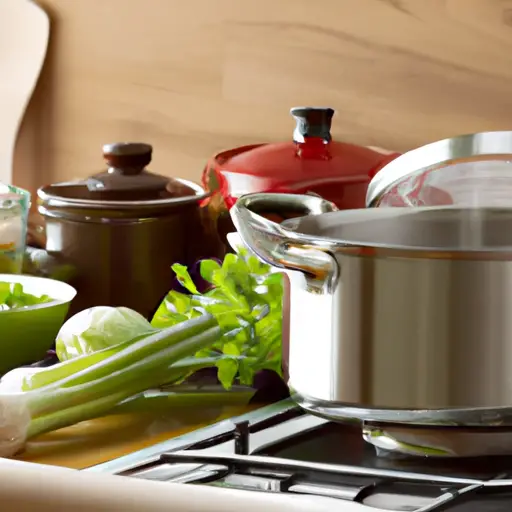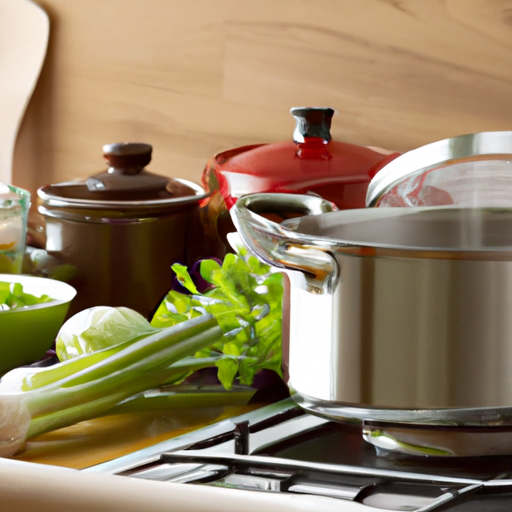Have you ever considered how much energy is used when cooking? It may not be something that crosses your mind often, but there are actually ways to make your cooking more eco-friendly and energy efficient. In this article, we’re going to explore some sustainable methods that can help you maximize energy efficiency in the kitchen. So, if you’re interested in reducing your carbon footprint while still enjoying delicious meals, keep reading!
One important aspect of eco-friendly cooking is off grid living. This means relying on alternative energy sources rather than the traditional electrical grid. Off grid living can involve using solar panels or wind turbines to generate electricity for cooking, among other activities. By harnessing renewable energy, you can not only reduce your environmental impact, but also save money in the long run. We’ll dive deeper into the benefits and challenges of off grid living in our article.
When it comes to energy consumption, different cooking methods vary in their efficiency. If you’re looking to minimize electricity usage, one of the most efficient methods is using a slow cooker or crockpot. These appliances use relatively low amounts of electricity and can be used for various meals, from stews to soups and even desserts. By cooking your meals slowly over a longer period of time, you not only consume less energy, but also end up with flavorful dishes. In our article, we’ll explore more cooking methods that help reduce energy consumption.
So, if you’re interested in learning more about eco-friendly cooking and how to maximize energy efficiency in the kitchen, stay tuned for our upcoming article. We’ll provide you with practical tips and sustainable methods that can help you make a positive impact on the environment while still enjoying delicious meals. Keep an eye out for the article and get ready to cook in a more eco-friendly way!

Eco-Friendly Cooking: Maximize Energy Efficiency with these Sustainable Methods
In today’s world, where sustainability and reducing our carbon footprint have become important goals, it is crucial to adopt eco-friendly practices in every aspect of our lives, including cooking. By making simple changes in our cooking methods and choices, we can significantly reduce energy consumption, save money, and contribute to a more sustainable future. In this article, we will discuss the benefits of eco-friendly cooking and explore various methods to maximize energy efficiency in the kitchen.
Benefits of Eco-Friendly Cooking
Reduces carbon footprint
One of the primary benefits of eco-friendly cooking is its ability to reduce our carbon footprint. Traditional cooking methods often rely on non-renewable energy sources such as gas and electricity, which contribute to the emission of greenhouse gases. By adopting sustainable cooking methods, you can significantly decrease your carbon emissions and help combat climate change.
Saves energy
Eco-friendly cooking methods are designed to save energy by minimizing wastage and maximizing efficiency. By using energy-efficient appliances and adopting smart cooking techniques, you can reduce the amount of energy consumed during the cooking process. This not only helps save valuable resources but also reduces your utility bills, leading to long-term cost savings.
Preserves natural resources
Another important benefit of eco-friendly cooking is the preservation of natural resources. Traditional cooking methods often result in the depletion of valuable resources such as water and fuel. By utilizing renewable energy sources and practicing water conservation, we can minimize our impact on the environment and ensure the sustainable use of these resources for future generations.
Importance of Energy Efficiency in Cooking
Minimizes environmental impact
Energy-efficient cooking methods play a crucial role in minimizing our overall environmental impact. By reducing energy consumption, we decrease the demand for fossil fuels and other non-renewable energy sources. This, in turn, helps reduce pollution, conserve natural resources, and protect fragile ecosystems.
Saves money on utility bills
One of the immediate benefits of energy-efficient cooking is the cost savings it brings. By using appliances and techniques that consume less energy, you can significantly reduce your monthly utility bills. Over time, these savings can add up, providing you with extra funds to invest in other sustainable practices or use them for other essential needs.
Increases sustainability
Choosing energy-efficient cooking methods is an effective way to increase sustainability. By embracing these practices, you become an active participant in the global sustainability movement, contributing towards a more balanced and eco-friendly future. Sustainable cooking methods not only benefit the environment but also inspire others to make similar changes, creating a ripple effect that can have a transformative impact on our society.
Choosing the Right Appliances for Eco-Friendly Cooking
When it comes to eco-friendly cooking, choosing the right appliances is crucial. Consider the following options to maximize energy efficiency in your kitchen:
Energy Star certified appliances
Opting for Energy Star certified appliances can significantly reduce your energy consumption. These appliances have been designed to meet strict energy efficiency guidelines set by the Environmental Protection Agency (EPA). Energy Star appliances consume less energy while delivering superior performance, making them an excellent choice for eco-conscious individuals.
Induction cooktops
Induction cooktops are another energy-efficient option worth considering. Unlike traditional gas or electric cooktops, which generate heat indirectly, induction cooktops use electromagnetic fields to directly heat the cooking vessel. This leads to faster cooking times, increased energy efficiency, and precise temperature control.
Solar-powered ovens
Harnessing the power of the sun, solar-powered ovens offer a sustainable and energy-efficient way to cook. These ovens utilize solar energy to heat and cook food, eliminating the need for traditional fuel sources. Solar ovens are a great choice for outdoor cooking, as they not only reduce energy consumption but also provide a unique and sustainable cooking experience.
Utilizing Renewable Energy Sources in Cooking
In addition to choosing energy-efficient appliances, utilizing renewable energy sources is vital for eco-friendly cooking. Consider incorporating the following methods into your cooking routine:
Solar cooking
Solar cooking is a simple and effective way to utilize renewable energy while preparing meals. With the help of solar cookers or ovens, you can harness the power of the sun to cook your food. Solar cooking reduces the use of traditional energy sources and produces zero emissions, making it an environmentally friendly option.
Biomass cooking
Biomass cooking involves using organic materials such as wood, agricultural waste, or biogas as a fuel source for cooking. This method not only reduces the reliance on fossil fuels but also promotes the use of sustainable and readily available resources. By utilizing biomass fuel, you can minimize your carbon footprint and contribute to a cleaner environment.
Wind-powered stoves
For those living in windy regions, wind-powered stoves offer an excellent opportunity to utilize renewable energy. These stoves have built-in wind turbines that generate electricity to power the cooking process. By harnessing the wind’s power, you can cook your meals while minimizing your reliance on traditional energy sources.
Implementing Water Conservation in Cooking
Water conservation plays a crucial role in eco-friendly cooking. By adopting the following practices, you can significantly reduce water wastage in the kitchen:
Using fresh produce efficiently
One of the simplest ways to conserve water is by using fresh produce efficiently. This involves washing vegetables and fruits in a basin filled with water instead of running water continuously. Additionally, reusing water from rinsing produce in other household tasks can help minimize water wastage.
Optimizing water usage during food preparation
Being mindful of water usage during food preparation can also contribute to water conservation. For instance, using a pot or steamer with a tight-fitting lid can reduce water evaporation and shorten cooking times, ultimately conserving water.
Collecting and reusing water
Collecting and reusing water is another effective way to minimize water wastage. For example, instead of letting water run down the drain while waiting for hot water, you can collect it in a container and use it for other purposes such as watering plants or cleaning.
Reducing Food Waste for Sustainable Cooking
Reducing food waste is a critical aspect of sustainable cooking. By implementing the following strategies, you can minimize food waste and promote a more sustainable kitchen:
Proper meal planning
Proper meal planning helps prevent food waste by ensuring you only purchase and prepare what you need. By creating a weekly meal plan, making a shopping list, and sticking to it, you can reduce the chances of buying excess ingredients that may go to waste.
Composting food scraps
Composting is an excellent way to reduce the amount of food waste that ends up in landfills. By composting food scraps, you can turn them into nutrient-rich fertilizer for your garden, closing the loop in the kitchen and reducing overall waste.
Preserving leftovers
Instead of discarding leftovers, preserving them for future meals is a sustainable approach. Invest in reusable food storage containers and make it a habit to store and consume leftovers promptly. This not only reduces food waste but also saves time and money by providing ready-to-eat meals for busy days.
Embracing Sustainable Cooking Techniques
In addition to utilizing eco-friendly appliances and ingredients, embracing sustainable cooking techniques can further enhance energy efficiency in the kitchen. Consider the following methods:
One-pot cooking
One-pot cooking involves preparing an entire meal using a single pot or pan. This technique not only saves time and effort but also reduces energy consumption by utilizing less heat and minimizing dishwashing.
Slow cooking
Slow cooking is a convenient and energy-efficient method that allows food to cook slowly over a longer period. By utilizing low heat and long cooking times, slow cooking tenderizes meats and infuses flavors while consuming less energy compared to traditional cooking methods.
Pressure cooking
Pressure cooking is another efficient way to cook meals quickly while using less energy. By trapping steam and increasing internal pressure, pressure cookers reduce cooking times by up to 70%, saving both time and energy.
Incorporating Seasonal and Locally Sourced Ingredients
Choosing seasonal and locally sourced ingredients is not only beneficial for your health but also promotes sustainability. Consider the following advantages:
Benefits of seasonal ingredients
Seasonal ingredients are at their peak freshness, flavor, and nutritional value. By incorporating seasonal produce in your cooking, you can enjoy the best-tasting and most nutritious meals while supporting your local farmers.
Supporting local farmers
When you choose locally sourced ingredients, you are supporting local farmers and their communities. By purchasing directly from farmers’ markets or joining community-supported agriculture (CSA) programs, you contribute to the sustainable growth of your local food system.
Reducing transportation emissions
Choosing locally sourced ingredients reduces the carbon emissions associated with long-distance transportation. When food is sourced from nearby regions, it requires less fuel for transportation, resulting in a smaller carbon footprint.
Smart Energy Management in the Kitchen
In addition to eco-friendly appliances and sustainable cooking techniques, adopting smart energy management practices can further enhance energy efficiency. Consider the following tips:
Efficient use of oven and stovetop
Preheating ovens only when necessary and using lids on pots and pans can significantly reduce energy consumption. Additionally, ensuring the proper fit of cookware with burner size can prevent heat loss and maximize efficiency.
Switching to energy-saving cookware
Investing in energy-saving cookware, such as copper-bottomed pans or cast iron skillets, can improve heat conductivity and reduce cooking time. Heat-efficient cookware ensures even heat distribution, leading to faster cooking times and lower energy consumption.
Using residual heat
Making use of residual heat is a simple yet effective way to save energy. Once your food is almost cooked, turn off the heat source and allow the residual heat in the kitchen to finish the cooking process. This ensures that you maximize energy efficiency without compromising the quality of your meal.
Conclusion
By adopting eco-friendly cooking methods, you can minimize energy consumption, reduce your carbon footprint, and contribute to a more sustainable future. From choosing energy-efficient appliances to utilizing renewable energy sources, implementing water conservation, and reducing food waste, there are numerous ways to maximize energy efficiency in the kitchen. By making conscious choices and embracing sustainable cooking techniques, you can play a vital role in creating a better and more sustainable world for future generations. So, go ahead, start making small changes today, and enjoy the benefits of eco-friendly cooking.





